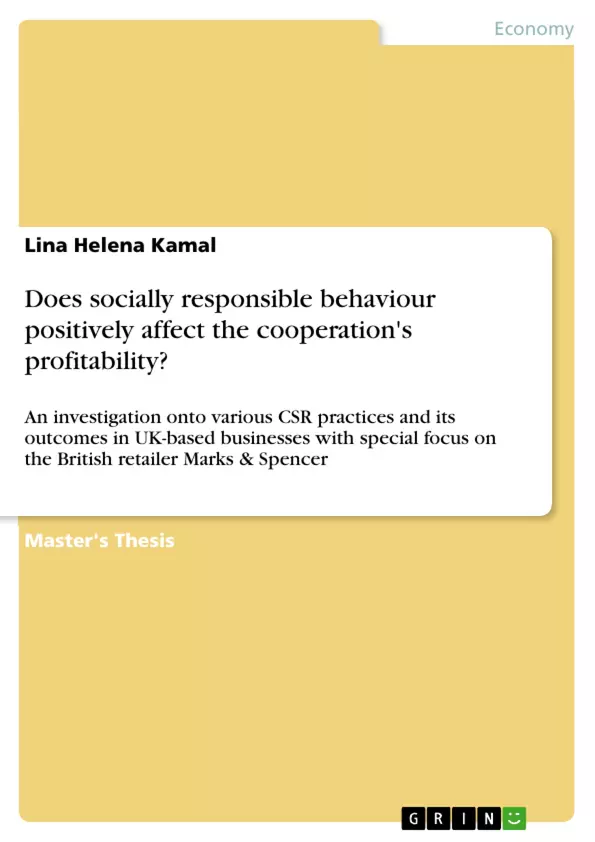Corporate Social Responsibility and sustainability are terms that are increasingly associated with businesses today. In this thesis we take a closer look at the practices involved in being a socially responsible cooperation and assess its influence on the performance of the cooperation to see if CSR behavior adds to the corporation’s profitability?
The author’s choice was to study Marks and Spencer’s sustainability strategy; plan A, for its responsible initiatives across its business operations have been creating debate and interest in the UK’s consumer market since its announcement in the year 2007.
The methodology’s process was inductive and followed a qualitative in-depth approach with the application of BSC, balanced score card; an assessment of M&S’ sustainability plan was conducted on four business aspects, customers, employees, internal processes and last the financial aspect. All was analyzed in the light of Hart and Milstein’s sustainability value framework. Nevertheless a quantitative approach was adopted through a financial performance comparison to British retailer John Lewis; to draw conclusions if M&S sustainability plan has indeed acted as a differentiator in performance against a competitor.
The findings supported no increased profitability for the cooperation. However they did reveal that socially responsible co operations do achieve better value proposition, better branding, and are generally more resilient to scandals as a result of higher trust from the customers’ side. Conclusions drawn from M&S study were that CSR practices help maintain and attract talent; it engages customers and increases their likelihood of repeat purchases, it also creates savings through a variety of efficiency measures on operational levels; small savings scattered across locations and departments which could substantially decrease the total cost of doing business.
Inhaltsverzeichnis (Table of Contents)
- 1.0 Introduction
- 1.1 Background & Academic Context
- 1.2 Purpose and Research Question
- 1.3 Choice of Case Study- Marks & Spencer
- 2.0 Theoretical Framework - Literature Review
- 2.1 Brief history on CSR
- 2.2 CSR Definitions
- 2.3 Creating Sustainable Value
- 2.3.1 Sustainable Value Framework
- 2.4 Problem Discussion
- 2.5 CSR & Profitability
- 2.5.1 CSR brings in the cash
- 2.5.2 Waste of shareholder money
- 2.6 Possible results for CSR
- 2.6.1 Employees & Work Environment
- 2.6.2 Cost Reduction
- 2.6.3 Sales & Marketing
- 2.6.3.1 Differentiation
- 2.6.3.2 Brand Reputation
- The impact of corporate social responsibility (CSR) on corporate performance
- The application of the balanced scorecard (BSC) to assess the sustainability strategy of Marks & Spencer
- The role of sustainable value creation in driving profitability
- The influence of CSR on employee engagement, cost reduction, and brand reputation
- The potential for CSR to act as a differentiator in the competitive landscape
- Chapter 1: Introduction: This chapter provides background information on the topic of CSR and sustainability, establishing the academic context for the study. It outlines the purpose of the dissertation and the research question, which seeks to determine whether CSR practices enhance profitability. The chapter also explains the choice of Marks & Spencer as the case study, highlighting its significant sustainability initiatives.
- Chapter 2: Theoretical Framework and Literature Review: This chapter delves into the theoretical framework of CSR, providing a brief history of the concept and exploring various definitions. It examines the concept of sustainable value creation and its relationship to CSR practices. The chapter further investigates the debate surrounding the link between CSR and profitability, examining arguments for and against the claim that CSR can increase financial returns. Additionally, it explores potential outcomes of CSR practices, including their impact on employee engagement, cost reduction, and sales and marketing efforts.
Zielsetzung und Themenschwerpunkte (Objectives and Key Themes)
This dissertation explores the relationship between socially responsible behaviour and corporate profitability, specifically examining the case of Marks & Spencer's sustainability strategy, "Plan A." The main objective is to determine whether socially responsible practices contribute to increased profitability.Zusammenfassung der Kapitel (Chapter Summaries)
Schlüsselwörter (Keywords)
The primary focus of this dissertation lies in the investigation of the relationship between socially responsible behaviour and corporate profitability, specifically examining the case of Marks & Spencer's sustainability strategy, "Plan A." Key terms and concepts include corporate social responsibility (CSR), sustainability, balanced scorecard (BSC), sustainable value creation, brand reputation, cost reduction, employee engagement, and the role of CSR in driving profitability.Does Corporate Social Responsibility (CSR) increase profitability?
The findings for Marks & Spencer's "Plan A" did not support a direct increase in profitability, but showed better value proposition and brand resilience.
What is Marks & Spencer’s "Plan A"?
It is a comprehensive sustainability strategy launched in 2007, covering responsible initiatives across all business operations.
What are the benefits of socially responsible behavior for a corporation?
Benefits include better branding, higher customer trust, cost savings through efficiency, and attracting/retaining talent.
How was M&S's performance compared in the study?
A quantitative financial comparison was made with the British retailer John Lewis to see if CSR acted as a performance differentiator.
Can CSR reduce the cost of doing business?
Yes, through efficiency measures on operational levels, small savings across various departments can substantially decrease total costs.



